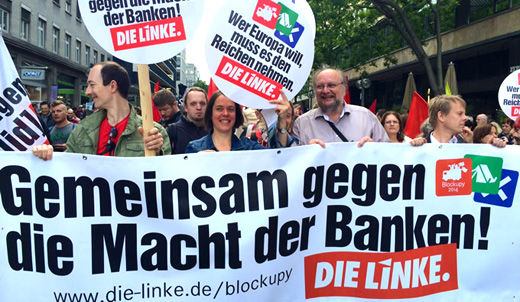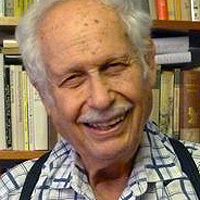
BERLIN — The Ukraine crisis was high on the agenda of die LINKE party congress here May 9-11. Opinions did differ, but the entire congress gave major blame for the crisis to NATO, the European Union and the German government. It opposed both sanctions against Russia and financial assistance for Kiev.
Even those critical of Putin called for more respect for Russia; Berlin chairman Klaus Lederer said: “We must never forget the immeasurable losses of the people of the Soviet Union during the invasion by Nazi Germany nor the sacrifices they made in freeing Europe from fascism.” Above all, the congress demanded negotiations and a rejection of any military escalation. Its Ukraine resolution, with some compromises, was passed almost unanimously by the congress.
Also almost unanimously, such agreement dismayed all its foes, and not just because of the one resolution. In the Bundestag the LINKE, which must be given at least a little TV time, offers the only real opposition to military adventures and rightwing actions, at home or abroad. It is therefore universally loathed (or secretly feared) by the other parties and their pet media. They always hope such a congress will end in a knock-down-drag-out fight, maybe even a fatal split. To their disappointment there was neither the one nor the other.
There was indeed some tension leading up to the congress. In a Bundestag vote on April 9 on sending a German frigate as escort to the American ship carrying poison gas away from Syria, LINKE delegates experienced a real split for the first time. Five, from the so-called “reformer” group, joined the other parties and voted in favor. 18 members abstained; they saw the deployment as part of a disarmament move – and thus not to be opposed. But 35 delegates braved angry attacks from the entire establishment (with two courageous exceptions from other parties) and voted No. For them sending that warship to the Mediterranean was no real necessity at all but rather one more global extension of German military and naval strength. The LINKE, they insisted, must keep its position of adamantly rejecting all such expansion. It must remain the one party of peace.
The main repercussions came from the outside. Both Social Democrats and Greens regard this strict “hands off” principle, extending even to causes they label, rightly or wrongly, as “humanitarian”, as a major stumbling block against any electoral coalition with the LINKE in 2017. That worries some so-called reformers who hope for just such a coalition. Others, who proved stronger at this congress, fear that weakening this basic tenet would land the party on the same slippery slope which turned the SPD and the Greens into weak-kneed collaborators with the same old powers-that-be and thus render the LINKE largely superfluous.
Such basic principles were not directly involved on a state level, thus permitting more flexibility on joining with other parties. Some approve cooperating with the SPD, others maintain that such coalitions do the party more harm than good. No general rules were determined. In the state of Brandenburg the two parties have governed together since 2009 and will most likely continue to do so after state elections in September. In Thuringia there is even a chance that LINKE and SPD could win a majority and form a coalition. But this time, with the LINKE stronger, and if the SPD agrees to be junior partner this could result in the first LINKE minister-president in unified Germany. That would be a true sensation, but one fraught with many possible traps and temptations.
On other issues there was general agreement: support for Venezuela against violent putsch attempts; rejection of military drones for Germany or their use from its bases; basic rejection of a capitalist system now forcing so many into poverty, also in Germany; rejection of the Transatlantic Trade and Investment Partnership (TTIP) being secretly negotiated between the EU and the USA, and support for the OCCUPY movement, now planning a world “BLOCKUPY” action against the big banks.
Calls to oppose neo-Nazis, fascists or any racists wherever they raise their hateful banners and stiff-armed salutes against Muslims, Jews, Roma people or immigrants were especially stressed by Gabi Zimmer, chair of the small leftist alliance in the European Parliament in which the LINKE, with 8 seats, has until now been the biggest group.
On May 22-25 Europeans from 28 countries will vote for a new parliament; it seems almost inevitable that the extreme right (and an only outwardly more moderate extreme right) will become much stronger, with more mandates for the Hungarian Jobbik, the Golden Dawn of Greece, France’s Front National, the United Kingdom Independence Party, the Freedom Party of Austria, maybe even Germany’s almost openly pro-Nazi National Democratic Party (NDP) and certainly the new Alternative for Germany (AfD), still wobbling in its position but like the others based on hatred toward foreigners and most minorities.
Gabi Zimmer stated that despite justified aversion to the European Union and its aims, it is wrong of some further-left groups and parties to reject participation. The European Parliament, the only elected part of the European Union, is worth fighting for; even the small Left wing alliance she has chaired, whose 35 members from 13 countries vary quite widely, has had some surprising achievements. She hopes for encouraging increases in its numbers from Spain, France, Italy, Ireland, and most of all from Greece.
Alexis Tsipras, top foreign guest at the congress, head of the strong Syriza party in Greece and candidate of the 26-member Party of the European Left for president of the European Commission, called for increased solidarity among progressives in Europe and a build-up of the left alliance within the European Parliament “as the only counterweight to the nightmare of the extreme right and the rebirth of the specter of fascism in Europe.”
In its election of all LINKE party officials, conflicts between the varying party wings resulted in some tight races. But despite conflicts there was no split but again a balance, with an equal number of women and men, of easterners and westerners, of reformers and more leftist “radicals.” Both co-presidents were re-elected: Katja Kipping, a woman from Dresden in East Germany, not really in the “reformer” camp, and Berndt Riexinger, a more leftist West German union leader. Together the two have managed to calm the stormiest party waves during their time in office and both are quite popular (the pro-and-con vote for Kipping was 77 to16 percent, for Riexinger 89 to 7 percent).
Here are some quotes from Riexinger’s main speech.
“…Looking back at the last two years we can feel truly proud of what we have achieved and accomplished together. I can well recall those months before and the weeks after Gottingen [the last congress] the negative poll results, the positional struggles which upset, demotivated – yes frustrated so many in the party. We presented no good image then. But together we have moved out of this trough. We are now the strongest opposition party in the German Bundestag!
“… While a small sector of society spends its boundless income and its fortunes on luxury apartments in the world’s big cities and showing off the size of its yachts, millions of people in factory jobs, temp work, mini-jobs and midi-jobs, short term contracts, low income jobs or self-employed, do not know whether they will still have work in the month ahead, or how they can pay rent and electricity bills and manage to live on their slender incomes…. We must spread hope that circumstances can be changed and improved. We must give people courage and the assurance that they can alter things, with elections and in the streets…
“… If one says one is a leftist one often feels pressure to say what one is not for. Not for barbed wire, not for dictatorship, not for injustices in China or some other place. No, we’re not. Period. But we must proudly say who and what we are for. We are for social justice, which is a thousand times better than being for injustice. We are proud to be on the left because that means we are against war, we favor policies of peace. We are for a future for young people, for unity of ecology, social justice and the economy. We are against exploitation and oppression. We believe that people can take their future into their own hands.
“… The LINKE will never become adjusted to a system that excludes millions of people from equal participation. We will never accept a situation where, in one of the world’s wealthiest societies, people must work and live in insecure, even lawless conditions. … No, dear comrades, we need not be ashamed of ourselves. Looking at the world today, it is those who are not on the left who must try to justify themselves. That is why we are proud to be on the left. To be a leftist means to squarely face the people, life and the future.”
Meet Victor Grossman In New York City at the People’s World table at the Left Forum, May 30 – June 1. Grossman will be autographing copies of his book, “Crossing the River: A Memoir of the American Left, the Cold War, and Life in East Germany.”












Comments